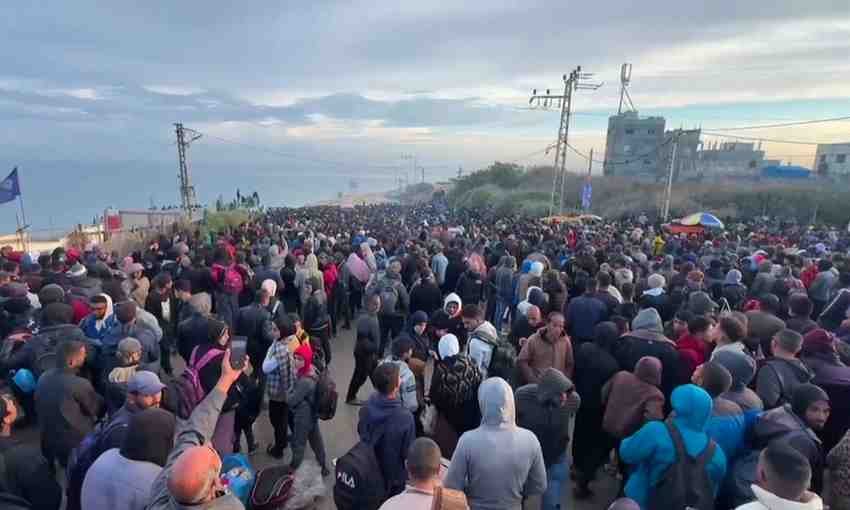Israel announced that Palestinians could begin returning to the northern Gaza Strip on Monday, following a deal with Hamas for the release of six hostages. This agreement, confirmed by Prime Minister Benjamin Netanyahu’s office, aims to maintain a fragile ceasefire in the ongoing Israel-Hamas conflict, which has severely impacted the Gaza Strip and displaced nearly all its residents.
The ceasefire has been precarious, with Israel previously blocking large groups of Palestinians from using a coastal road to return to northern Gaza. Israeli officials accused Hamas of breaching the truce by not releasing civilian women hostages as promised. However, Netanyahu’s office stated that Hamas has agreed to release three hostages on Thursday, with an additional three set for release on Saturday.
Palestinian leaders have expressed strong opposition to a controversial proposal by former U.S. President Donald Trump, who suggested “cleaning out” Gaza. Trump described the region as a “demolition site” and indicated discussions with Jordan’s King Abdullah II about relocating Palestinians. He expressed a desire for Egypt and Jordan to accept displaced individuals, stating, “You’re talking about probably a million and a half people, and we just clean out that whole thing.”
Mahmud Abbas, the Palestinian leader based in the Israeli-occupied West Bank, condemned any plans aimed at displacing Palestinians from Gaza. Bassem Naim, a member of Hamas’s political bureau, asserted that Palestinians would resist such initiatives, recalling past attempts at displacement that have been thwarted over the years. Islamic Jihad, which has allied with Hamas in the conflict, labeled Trump’s proposal as “deplorable.”
For many Palestinians, the idea of relocation evokes painful memories of the “Nakba,” or catastrophe, referring to the mass displacement that occurred during the establishment of Israel in 1948. Displaced Gaza resident Rashad al-Naji firmly stated, “We say to Trump and the whole world: we will not leave Palestine or Gaza, no matter what happens.”
Both Jordan and Egypt have rejected the notion of displacing Palestinians. Jordanian Foreign Minister Ayman Safadi emphasized that Jordan’s stance against the displacement of Palestinians is unwavering, asserting, “Jordan is for Jordanians and Palestine is for Palestinians.” Similarly, Egypt’s foreign ministry reiterated its commitment to protecting the “inalienable rights” of Palestinians.
In Gaza, the situation remains tense as cars and carts filled with belongings congested a road near the Netzarim Corridor, which Israel had blocked, preventing the anticipated return of hundreds of thousands of people to northern Gaza. Israel had previously stated that it would restrict Palestinians’ movement until the release of Arbel Yehud, a civilian woman hostage, who is among those expected to be freed on Thursday.
Hamas contended that Israel’s actions to block returns to northern Gaza also constituted a violation of the truce, asserting that it had provided “all the necessary guarantees” for Yehud’s release.
The ongoing humanitarian crisis in Gaza remains dire, despite the truce allowing for increased aid deliveries. The United Nations has reported that the situation continues to deteriorate. During the initial phase of the ceasefire, 33 hostages are scheduled to be released in staggered exchanges over six weeks, in return for approximately 1,900 Palestinians held in Israeli prisons.
The most recent hostage exchange involved the release of four Israeli women, all soldiers, in exchange for 200 Palestinian prisoners, nearly all of whom were incarcerated in Israel. This marked the second such exchange during the fragile truce, which is now entering its second week.
Dani Miran, whose son Omri remains a hostage and is not included in the upcoming releases, demonstrated outside Netanyahu’s office in Jerusalem, urging for the continuation of the agreement and the swift return of all hostages.
As the conflict continues, the toll has been devastating. Of the 251 hostages taken during Hamas’s attack on October 7, 2023, 87 are still believed to be in Gaza, with 34 confirmed dead, according to military sources. The initial attack by Hamas resulted in the deaths of 1,210 individuals, primarily civilians, based on an AFP tally of official Israeli figures. In retaliation, Israel’s military offensive has claimed at least 47,306 lives in Gaza, with the majority being civilians, according to figures from the Hamas-run health ministry, which the United Nations considers reliable.
As the situation evolves, the international community watches closely, hoping for a resolution that addresses the humanitarian needs of the people in Gaza while navigating the complex political landscape of the region.








